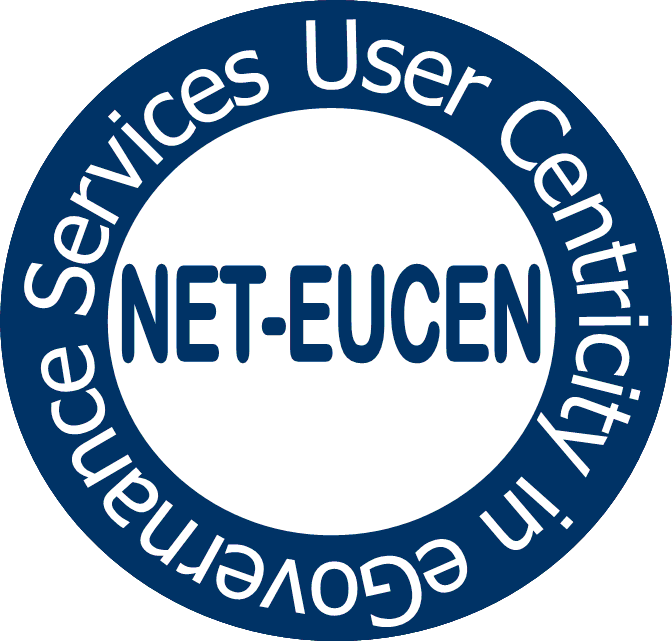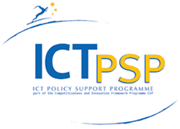Navigation
Share this Subscribe to our mailing listArticles Hierarchy
NET-EUCEN
 |
NET-EUCEN Network of European Stakeholders for Enhance User Centricity in eGovernance |
EU project (CIP-PSP) Started April 2010 Finished March 2013 www.net-eucen.org/ |
|
The NET-EUCEN project established a European network of stakeholders with an interest in enhancing user-centricity in public services. The network is a multidisciplinary eGovernment community covering the whole supply chain: Users, associations, public administrations, software developers, services providers, cultural facilitators, researchers and experts. The overall aim is to make user-centricity a condition for developing public services to ensure the services match the user’s needs and requirements. In order to establish a common ground for user-centricity, the project will locate good practices of digital citizen services and scout opportunities for innovative ICT based e-Gov solutions. The network will also develop and assess new and innovative application scenarios and foster their industrialisation set-up all over Europe. As a result the network will provide the European Commission with a set of guidelines about the citizen needs and applications of user-centric services which can also be used as a benchmark for public administrations. Rationale As the Internet permeates daily life, public expectations and concerns about the information society are changing. Users are concerned about the quality and accuracy of the content as well as privacy and safety. Safeguards need to evolve to match technology and market developments, without stifling the huge opportunities that online social and economic activity offers. There is a greater need for a coordinated, horizontal government approach since ICTs are increasingly addressing policy challenges in areas as diverse as education, healthcare, climate change and energy efficiency. Efforts to improve coordination and reduce duplication are likely to intensify with the economic decline, greater strains on government budgets, and pressures on long-term investments. It also becomes clear that government cannot deal with the complex problems alone and that citizens will have to play a larger part in achieving shared public policy goals. Public participation and user engagement is seen as a potential innovation driver in both the private and public sectors. Today, a growing proportion of services are knowledge-based services which require a high degree of interaction and involvement of end-users as active collaborators, rather than passive beneficiaries. Co-design and delivery of policies, programmes and services with citizens, businesses and civil society offers the potential to tap a broader reservoir of ideas and innovative solutions. The competitiveness in a globalised, knowledge society will depend on the ability to mobilise knowledge networks and foster creativity through openness and engagement. Expected Project Outcomes The project developed guidelines for user centric delivery of eGovernment services in a five to ten year time frame. To this end, the project set-up a large European network composed by experienced user service projects, coordinators and participants, sharing common practices, objectives and work methods. These include involvement of:
|
||
| The role of In-JeT ApS in the project In-JeT participated in the project as a technology transfer consultancy company with extensive experience in building future scenarios and implementing ICT solutions and strategies and with considerable knowledge of eDemocracy services. Besides disseminating the project and attracting more members and experts, In-JeT was involved in gathering best practises in Denmark in regard to citizen services, especially in the area of eDemocracy. We supported the process of mapping and analysing current practices and developing future scenarios. In relation to scenario building, In-JeT arranged a scenario workshop in Denmark in June 2011 titled ‘Digital Citizen Engagement in year 2017’. The results was described in a report which was released early 2012. |
||
Partners Innova Spa, Italy University Of The Aegean-Research Unit, Greece Steinbeis Innovation Ggmbh, Germany Inovamais - Servicos De Consultadoria Em Inovacao Tecnologica S.A., Portugal Cheshire Henbury, United Kingdom Techin Spolka Z Ograniczona Odpowiedzialnoscia, Poland Whitehall Reply Srl, Italy Sia DMG, Latvia Centre De Recherche Public Henri Tudor, Luxembourg Ventspils Digitalais Centrs, Latvia Association For The Promotion Of Information On Science And Technology For All Countries, France Malta Information Technology Agency, Malta Technical Support For European Organisations Sprl, Belgium Hogskolen i Vestfold, Vestfold University College, Norway Edata Srl, Romania Birmingham City Council, United Kingdom EUROCONSULTANTS S.A., Greece INFORMACINES VISUOMENES PLETROS KOMITETAS PRIE LIETUVOS RESPUBLIKOS VYRIAUSYBES ISTAIGA, Lithuania In-JeT ApS, Denmark Puskas Tivadar Kozalapitvany, Hungary Dida Network srl., Italy |
||
| Funding The NET-EUCEN Thematic Network (Grant Agreement no. 250522) is co-funded by the European Commission, Information Society and Media Directorate-General, under the ICT Policy Support Programme (ICT PSP) as part of the Competitiveness and Innovation Framework Programme http://ec.europa.eu/cip/ Project budget: 0.69 m€ Project funding: 0.69 m€ Project start date: 1 April 2010 Project end date: 31 March 2013 |
 |
|
|
|
||



